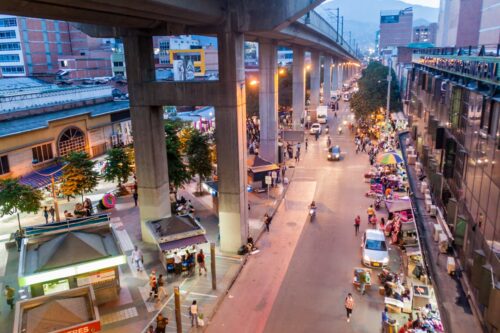UrbanLinks Event: Financing Urban Infrastructure

USAID’s E3/Urban Team is launching a new event series that will examine important issues in urban development and feature experts who can share innovative ideas and best practices in sustainable urban development.
At the UN Conference on Housing and Urban Development (Habitat III) in October, the global community agreed to an ambitious and comprehensive framework to guide sustainable urbanization for the next 20 years: the New Urban Agenda. A key constraint to achieving this ambitious agenda is insufficient financial resources to develop and maintain resilient urban infrastructure. Working with cities to bridge this financing gap is critical.
The first UrbanLinks event will explore this topic by examining:
- Current challenges in urban infrastructure finance with a focus on areas with high concentrations of poverty.
- What types of financing work best in which situations and what the prerequisites are: Public-Private Partnerships, development banks, credit enhancement or guarantees, on-lending, private capital.
- The role of USAID and other donors
We invite you to join us—in person or online–for a panel discussion moderated by USAID Deputy Assistant Administrator Carrie Thompson, followed by an open conversation that allows for audience Q&A on Wednesday February 1, 2017, 9-10:30 a.m. EST.
Participate Virtually
Event Access Code: 735 349 227
When it’s time, join the event online.
Join by phone
+1-855-282-6330 US TOLL FREE
+1-415-655-0003 US TOLL
Global call-in numbers | Toll-free calling restrictions
Trouble joining the event?
Get to know the panel:
Moderator:
Carrie Thompson is Deputy Assistant Administrator for USAID’s Bureau for Economic Growth, Education and Environment (E3). In this capacity, she oversees the work of the Global Climate Change, Forestry and Biodiversity, and Land and Urban Offices. Before returning to Washington she served as Deputy Director of USAID’s Regional Development Mission for Asia based in Bangkok, Thailand, where she provided oversight on regional programs that address trans-boundary challenges such as infectious diseases, human and wildlife trafficking, economic integration and shared use of natural resources, and on bilateral programs in China, Thailand and Laos. Ms. Thompson is a career member of the U.S. Senior Foreign Service. Prior to joining USAID she worked for the Overseas Private Investment Corporation in Washington and various international trade and finance firms.
Panelists
David Painter has more than 35 years of experience in public and private sector urban infrastructure financing, including 25 years with the USAID Foreign Service. Since 2004 he has advised organizations such as the World Bank, the Public Private Infrastructure Advisory Facility (PPIAF), the Cities Alliance, and Evensen Dodge International on improving city creditworthiness and facilitating long-term urban infrastructure financing through local capital markets. As former Director of the USAID Office of Housing & Urban Programs in Washington, D.C., David provided leadership for USAID on issues of pro-poor urban development including the financing of housing and municipal infrastructure, and implementation of the Agency’s Making Cities Work strategy. While based overseas, David directed the operations of the USAID Regional Housing and Urban Development Offices in Asia (based in Bangkok), and the Middle East & North Africa (based in Tunis). Before those assignments he managed a major USAID housing and community upgrading project in Cairo, Egypt.
Kirti Devi is a Municipal Finance Specialist for the World Bank at the Public Private Infrastructure Advisory Facility (PPIAF); she assists in the management of activities under PPIAF’s Sub-National Technical Assistance program. Prior to joining the World Bank, Kirti worked for U.S. based consulting firms that specialized in international development and public finance, and has assisted multiple cities to secure competitively awarded grant funding for affordable housing and urban development, under a range of U.S. Housing and Urban Development programs. Before moving to the U.S., she worked for the Indo-USAID Financial Institutions Reform and Expansion Project in India (FIRE-D Project) on sub-national planning and finance. The FIRE-D Project introduced municipal credit ratings in India, supported the first municipal bond issue in the country without a state guarantee, and supported the first pooled finance transaction in Asia. And Kirti was a core part of this team.
Christopher Kaczmarski has a record of over 20 years of international experience working in the capacity of chief of party, team leader and long-term resident advisor on donor projects, assisting national and subnational level governments and institutions through policy advise, formulation, planning and implementation of corresponding technical assistance and capacity building programs in the area of environmental management, climate change adaptation (CCA) and sustainable development financing. Combines strong technical background with skills in financial management and analysis, and has successful track record of effective policies development and implementation. Served as one of the lead global experts providing direct technical assistance to the governments requesting support for the development of National Adaptation Plans (NAP) and corresponding regulations under joint (UNDP-UNEP) Global Support Program (GSP). Recognized expert in developing and implementation of projects focused on strengthening of government capacity, mainstreaming CCA policies into national strategies and development plans. Extensive regional experience in South East Asia and Pacific Island States where he has introduced and implemented a a number of project initiatives on climate change adaptation.

